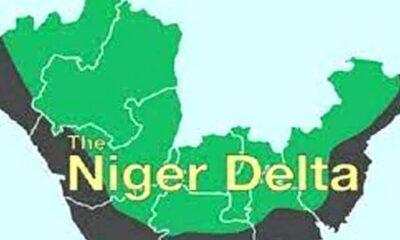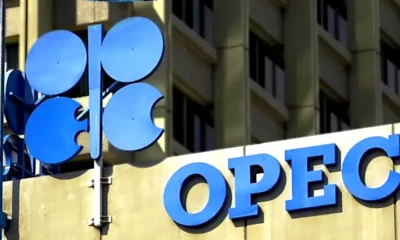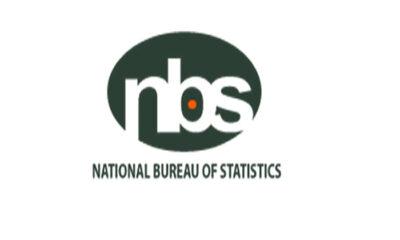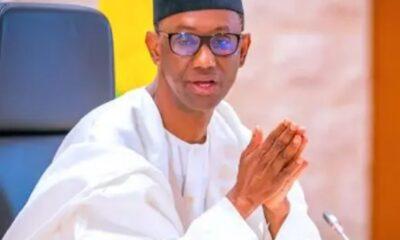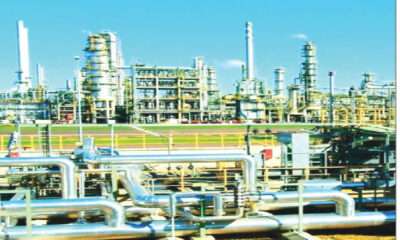Business
Crude Oil Sales Rise By 46% To N21tn – NBS
Published
1 year agoon
By
Editor
Nigeria’s crude oil sales rose by 46.41 per cent to push Nigeria’s total export to N26.79tn in 2022.
This is as total trade rose by 31.79 per cent from N39.75tn in 2021 to N52.39tn in 2022. In 2022, crude oil sales totalled N21.09tn, a 46.41 per cent increase from N14.41tn in 2021. In 2022, crude oil accounted for 78.74 per cent of total export.
According to data from the National Bureau of Statistics, total exports for 2022 rose by 41.72 per cent from N18.91tn in 2021 to N26.79tn as of 2022. Imports rose by 22.77 per cent from N20.84tn in 2021 to N25.59tn in 2022.
In 2022, Nigeria spent N2.63tn importing food and live animal; N10.12tn importing petroleum and other mineral fuel; N1.93tn on manufactured goods; and N5.93tn on machinery and transport equipment.
READ ALSO: Crude Oil Production: Angola, Libya Overtake Nigeria — OPEC Report
Commenting on the growth of foreign trade, the NBS said, “In the fourth quarter of 2022, Nigeria’s total trade stood at N11.72tn of which total exports stood at N6.36tn and total imports amounted to N5.36tn.
“On an annual basis, total trade was N52.39tn, total imports amounted to N25.59tn, and total exports were recorded at N26.79tn.”
Explaining the breakdown for Q4, 2022, the national statistics body stated, “The top five export destinations in the fourth quarter of 2022 were Spain, Netherlands, India, France, and Indonesia accounting for 9.70 per cent, 9.03 per cent, 7.71 per cent, 7.70 per cent and 7.44 per cent respectively of total exports.
“Altogether, exports to the top five countries amounted to 41.59 per cent of the total value of exports.”
It added, “In terms of Imports, in the fourth quarter of 2022, China, Belgium, India, The Netherlands, and the United States of America were the top five countries of origin of imports to Nigeria.
“The values of imports from the top five countries amounted to N2.99tn representing a share of 55.82 per cent of the total value of imports. The commodities with the largest values of imported products were ‘Motor Spirit Ordinary’ (N1.56tn), ‘Gas Oil’ (N220.47bn), and ‘Durum Wheat (Not in seeds)’ (N187.96bn)”
READ ALSO: How Govt Officials Facilitated $1.2bn Crude Oil, Gas Theft – Source
Despite witnessing a boost in crude oil sales, the World Bank had stated that Nigeria did not benefit from oil price boom because of fuel subsidies and reduce oil production.
According to the global bank, the average price of crude oil increased by over 150 per cent from 2020 to 2022, but Nigeria’s macroeconomic performance weakened over this time, with its fiscal space shrinking. It stated that in 2022, the government fiscal deficit was estimated to have increased to 5.7 percent of GDP from 5.4 percent in 2020 before the boom.
The Washington-based bank said that high production costs, theft and insecurity, joint-venture cash-call arrears, and inadequate investment have caused Nigeria’s crude oil output to fall consistently below its Organisation of the Petroleum Exporting Countries quota since June 2020.
Commenting on fuel subsidy, the bank explained, “Second, the ballooning cost of the petrol subsidy: The continuation of the petrol subsidy (deducted directly from oil revenues) implies forgone fiscal revenues of 2.5–2.7 per cent of GDP in 2022.
“This, combined with the protracted decline in oil production, has resulted in the lowest levels of net oil revenues (in percent of GDP) being transferred to the government in over a decade.”
In its recent article IV report on Nigeria, the International Monetary Fund stated, “Higher oil prices are yet to deliver tangible benefits amid contraction of oil production and costly fuel subsidies.”
According to the IMF, Nigeria has missed its opportunity to benefit from higher global oil prices. From January to July 2022, Nigeria’s oil production slumped by 28 million barrels threatening the Federal Government’s N9.37tn oil and gas revenue target for 2022.
READ ALSO: Stolen Crude Oil Found In Churches, Mosques – NNPC
From January and April, the government projected that it would earn N3.12tn, but only generated only N1.23tn in the period.
A former President, Association of National Accountants of Nigeria, Dr Sam Nzekwe, had stated that the continued reduction in oil production and the country’s inability to meet its revenue target might lead to bankruptcy.
He said, “The massive oil theft in the Niger Delta, which is on an industrial scale, has continued to stop Nigeria from meeting its OPEC production quota. The impact of this is very clear. The finance minister told you that the government was finding it difficult to meet its obligations because of a lack of funds.”
You may like


Why Nigeria’s Oil Belongs To The North – Ex-presidential Aide


Crude Prices Drop After Angola Quits OPEC


FG Cracks Down On Producers Over Domestic Crude Oil Supply To Refineries


Lagos Leads, Bayelsa, Others Come Bottom As Bureau Of Statistics Releases 2022 IGR [Full List]


Lagos, Rivers Lead As States Rake In N1.93tn – NBS


Nigeria Still Losing 400,000 Barrels Of Crude Oil Daily – NSA

The Central Bank of Nigeria (CBN) started fresh and direct sales of US dollars at N1,021 per dollar to Bureau De Change operators.
Nigeria’s apex bank disclosed this in a circular signed by its Director of Trade and Exchange Department Hassan Mahmud.
“We write to inform you of the sale of $10,000 by the Central Bank of Nigeria (CBN) to BDCs at the rate of N1,021/$1. The BDCs are in turn to sell to eligible end users at a spread of NOT MORE THAN 1.5 percent above the purchase price,” the circular posted on its website read.
READ ALSO: Tinubu Unveils African Counter-Terrorism Summit
“ALL eligible BDCs are therefore directed to commence payment of the Naira deposit to the underlisted CBN Naira Deposit Account Numbers from today, Monday, April 22, 2024, and submit confirmation of payment, with other necessary documentations, for disbursement of FX at the respective CBN Branches.”
CBN’s move is coming as the naira is recording a slight depreciation against the dollar after weeks of gains.
In late March, the bank also sold $10,000 to each of the eligible Bureau De Change (BDC) operators in the country at the rate of N1,251/$1.
READ ALSO: Mixed Reactions Trail Video Of Couple’s Customised N200 Notes
Like in the most recent sales, it warned BDCs against breaching terms of the dollar sales, vowing to sanction defaulters “including outright suspension from further participation in the sale”.
The fortunes of the naira have fallen sharply since President Bola Tinubu took over in May. Inflation figures have reached new highs and the cost of living hitting the rooftops.
Nigeria’s currency slid to about N1,900/$ some months ago at the parallel market. But in recent weeks, it has gained against the dollar.
The Nigerian authorities have also doubled down on their crackdown against cryptocurrency platform Binance and illegal BDCs.
On March 1, the CBN revoked the licences of 4,173 BDCs over compliance failures.

Olusegun Alebiosu has been appointed as the Acting Managing Director/Chief Executive Officer of First Bank of Nigeria Limited (FirstBank Group), effective April 2024.
Alebiosu steps into this pivotal role from his previous position as the Executive Director, Chief Risk Officer, and Executive Compliance Officer, a position he held since January 2022.
Alebiosu brings to the helm of FirstBank over 28 years of extensive experience in the banking and financial services industry. His expertise spans various domains including credit risk management, financial planning and control, corporate and commercial banking, agriculture financing, oil and gas, transportation, and project financing.
READ ALSO: JUST IN: Access Holdings Names New Acting CEO
Having embarked on his professional journey in 1991 with Oceanic Bank Plc. (now EcoBank Plc.), Alebiosu has held several notable positions in esteemed financial institutions.
Prior to joining FirstBank in 2016, he served as Chief Risk Officer at Coronation Merchant Bank Limited, Chief Credit Risk Officer at the African Development Bank Group, and Group Head of Credit Policy & Deputy Chief Credit Risk Officer at United Bank for Africa Plc.
Alebiosu’s academic credentials further enrich his professional profile. He is an alumnus of the Harvard School of Government and holds a Bachelor’s degree in Industrial Relations and Personnel Management. Additionally, he obtained a Master’s degree in International Law and Diplomacy from the University of Lagos, as well as a Master’s degree in Development Studies from the London School of Economics and Political Science.
READ ALSO: Meet Newly Appointed Union Bank CEO
A distinguished member of various professional bodies, including the Institute of Chartered Accountants (FCA), Nigeria Institute of Management (ANIM), and Chartered Institute of Bankers of Nigeria (CIBN), Alebiosu is renowned for his commitment to excellence and ethical practices in the banking sector.
Beyond his professional endeavors, Alebiosu is known for his passion for golf and adventure. He is happily married and a proud parent.
With Alebiosu’s appointment, FirstBank of Nigeria Limited anticipates continued growth and innovation under his leadership, reinforcing its position as a leading financial institution in Nigeria and beyond.
Business
CBN Gives New Directive On Lending In Real Estate
Published
1 week agoon
April 17, 2024By
Editor
The Central Bank of Nigeria, CBN, has released a new regulatory directive to enhance lending to the real sector of the Nigerian economy.
The directive, issued on April 17, 2024, with reference number BSD/DIR/PUB/LAB/017/005 and signed by the Acting Director of Banking Supervision, Adetona Adedeji, signifies a notable shift in the bank’s policy towards a more contractionary approach.
In line with the new measures, the CBN has reduced the loan-to-deposit ratio by 15 percentage points, down to 50 per cent.
This move aligns with the CBN’s current monetary tightening policies and reflects the increase in the Cash Reserve ratio rate for banks.
READ ALSO: JUST IN: CBN Gov Sacks Eight Directors, 32 Others
The LDR is a metric used to evaluate a bank’s liquidity by comparing its total loans to its total deposits over the same period, expressed as a percentage.
An excessively high ratio may indicate insufficient liquidity to meet unexpected fund requirements.
All Deposit Money Banks are now mandated to adhere to this revised LDR.
The CBN has stated that average daily figures will be utilised to gauge compliance with this directive.
Furthermore, while DMBs are encouraged to maintain robust risk management practices in their lending activities, the CBN has committed to continuous monitoring of adherence and will adjust the LDR as necessary based on market developments.
READ ALSO: JUST IN: CBN Increases Interest Rate To 24.75%
Adedeji has called on all banks to acknowledge these modifications and adjust their operations accordingly. He emphasised that this regulatory adjustment is anticipated to significantly influence the banking sector and the wider Nigerian economy.
The circular read in part, “Following a shift in the Bank’s policy stance towards a more contractionary approach, it is crucial to revise the loan-to-deposit ratio policy to conform with the CBN’s ongoing monetary tightening.
“Consequently, the CBN has decided to decrease the LDR by 15 percentage points to 50 per cent, proportionate to the rise in the CRR rate for banks.
“All DMBs must maintain this level, and it is advised that average daily figures will still be applied for compliance assessment.
“While DMBs are urged to sustain strong risk management practices concerning their lending operations, the CBN will persist in monitoring compliance, reviewing market developments, and making necessary adjustments to the LDR. Please be guided accordingly.”

Man Jumps Into Lagoon, Dies After Being Chased By Mob For Alleged Stealing

UNIBEN Ex-deputy VC Is Dead

How I Formed Kidnap Gang During My 11yrs In Prison- Suspected Kidnapper
Trending

 News3 days ago
News3 days agoDrama! Supporters Of Yahaya Bello Perform Rituals to Prevent His Arrest By EFCC [Video]

 Headline4 days ago
Headline4 days agoDrama As Women Fight Dirty, Breasts Fall Out During Spring Break Outing In US [PHOTOS/VIDEO]

 Entertainment4 days ago
Entertainment4 days agoNollywood Actor, Zulu Adigwe Is Dead

 News3 days ago
News3 days agoVIDEO: Force PRO Orders Arrest Officers Caught On Video Bashing Driver’s Car

 Headline4 days ago
Headline4 days agoMeet 17-year-old Nigerian Who Won $3.5m Worth Of Scholarships From Harvard, 13 Other Foreign Universities

 Metro3 days ago
Metro3 days agoEdo Cultists Kill Rival In Daughter’s Presence, Abandon Getaway Car

 Politics5 days ago
Politics5 days agoEdo Guber Final List : Group Knocks LP, Commends, INEC, Yakubu

 Headline4 days ago
Headline4 days agoVideo Of Girl Being Bullied, Slapped At Lead British School Sparks Outrage Online [PHOTOS/VIDEO]

 Headline2 days ago
Headline2 days agoVIDEO: Meet Nigerian Pastor Who Predicted World Will End April 25

 News4 days ago
News4 days agoBREAKING: Dangote Further Crashes Diesel, Aviation Fuel Price
